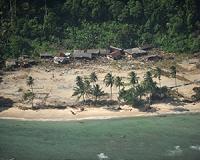 |
Constitucion, Chile (AFP) Feb 23, 2011 The debris is gone, but one year after one of the most powerful earthquakes ever to hit humankind, Chile is still living with the trauma of a disaster that killed 524 people. Strong after-shocks continue to be felt in this South American nation, creating new pangs of anxiety for thousands still receiving emergency food rations as they wait for the reconstruction of their homes. "This wound will never heal, it just has to be coped with," said boatman Emilio Gutierrez, who lost his young son, his father and his house to the tsunami that followed the quake on February 27, 2010. That seism measured 8.8 on the open-ended moment magnitude scale, a cataclysmic force that burst from an epicenter just off the coast of a town called Constitucion, near the capital Santiago. It was the fifth-most powerful quake ever recorded. Gutierrez, living in Constitucion, had tried to save his family, putting his four-year-old boy with his father in one boat and following in another. The tsunami towered 15 meters (50 feet) over the other boat as he watched, terrified, then swept the other two away to their deaths. "I found my father but never found my son. I walked around for 10 months looking for him every day," Gutierrez told AFP. Ultimately, he had to resign himself to officials telling him all hope was lost. "I'm going to let him rest in peace, because I didn't find him," he sighed. Jimena Toledo, a resident in nearby Dichato, likewise said the nightmare of last year would never be forgotten. "Forget what we lived that night? I think that would take an eternity. We are going to die remembering. I close my eyes and I can still hear people screaming for help. I can still hear the noise of the ocean, even smell it," she said. The topic of the quake dominates table conversations in the area, a dark contrast to the region's reputation for summer beach vacations. A morbid tourism has even sprung up, with visitors dropping in to see the after-effects of nature's wrath. Bitterness lingers over the deadly miscalculation of officials that day. A tsunami warning was issued after the quake then canceled on the navy's mistaken advice that no danger was imminent. That blunder, which greatly worsened the death toll, is today the subject of an investigation. The temblor also proved devastating economically: There are now half a million more poor people in Chile as a result. Some 220,000 homes, 3,700 schools, 17 hospitals and 212 bridges were destroyed, according to official figures. The total cost of the damage has been put at 30 billion dollars, or 18 percent of Chile's gross domestic product. In Dichato, almost all the 3,000 residents are in temporary shelters in a zone with no running water, where the cramped living conditions are reviled by those forced to stay there. "Life in the village is horrible, disgusting. To me, it's like being in a concentration camp," Toledo said. They and others left homeless from the quake are still waiting for new homes. Authorities said 135,000 people have been assigned houses to houses yet to be built, but bureaucracy was dragging out the process. Analysts, though, note that Chile -- a relatively prosperous nation with solid buildings -- came out of its disaster better than, for example, Haiti, whose less powerful quake just a month earlier proved more deadly, killing more than 220,000 people. "Effectively, the damage is significantly less if we take into account that the private sector is operating normally a year after the quake" in Chile, and the national economy managed to grow 5.2 percent in 2010, an economist, Alejandro Fernandez, said. But that is no comfort to those who lost loved ones and livelihoods. Gutierrez worked with other families in his town to have a memorial built to his son and the others killed. In front of it, he has placed a toy boat and flowers. Tourists are still coming, still taking trips in boats from Constitucion. But they are not swimming in the water like they used to. "People don't want to swim out of respect of those who disappeared. Me neither, I don't want to swim. For them. For the respect I have for them," Gutierrez said. His tears are now what he gives to the ocean, when he is in his boat away from his wife and their month-old baby girl. "The other day I put the boat in the water, and I started to cry," he said. "It hurts. A year ago, I was putting it in the water with (my son) Emilito in it alongside my father," he said. "Now I'm in it alone."
Share This Article With Planet Earth
Related Links Bringing Order To A World Of Disasters A world of storm and tempest When the Earth Quakes
 Better Mapping Of Human Settlements Supports Disaster Management
Better Mapping Of Human Settlements Supports Disaster ManagementParis, France (SPX) Feb 24, 2011 When a major disaster strikes in remote parts of the world, knowing if the area is populated, and how densely, is crucial for the effective organisation of humanitarian operations. The Global Human Settlements Layer (GHSL), developed by the European Commission's Joint Research Centre (JRC), will soon provide this detailed information for the first time on a global scale. The breakthrough i ... read more |
|
| The content herein, unless otherwise known to be public domain, are Copyright 1995-2010 - SpaceDaily. AFP and UPI Wire Stories are copyright Agence France-Presse and United Press International. ESA Portal Reports are copyright European Space Agency. All NASA sourced material is public domain. Additional copyrights may apply in whole or part to other bona fide parties. Advertising does not imply endorsement,agreement or approval of any opinions, statements or information provided by SpaceDaily on any Web page published or hosted by SpaceDaily. Privacy Statement |